8 Japanese Life Philosophies That Can Completely Change Your Life
| Contents |
Are you interested in embracing a more joyful existence? Incorporate these 8 Japanese philosophies or concepts into your life to revolutionize it and cultivate an appreciation for the uncomplicated aspects, while prompting you to critically examine your daily routines.
The most advantageous mindsets and perspectives to adopt and adhere to originate from Japanese culture. Given that it is home to the oldest surviving population in the world, it is unquestionably important to follow their way of life. Examine the eight Japanese philosophies in order to facilitate personal transformation.
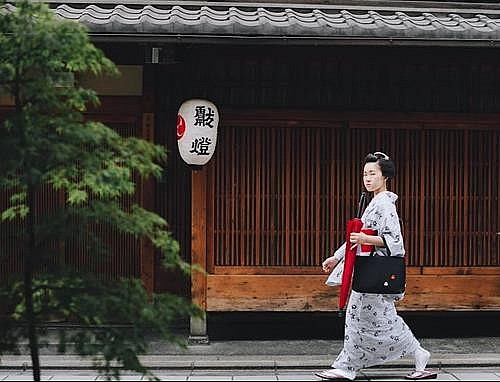 |
| Japanese life philosophies |
1. Ikigai Philosophy
Ikigai is a Japanese concept that means "reason for being" and refers to what motivates you to get up in the morning and gives your life purpose and meaning. When you discover your ikigai, life becomes more meaningful and satisfying. You possess a sense of purpose and direction.
The concept of ikigai has gained popularity from Asia to Europe in recent years, and while the term has been used in Japan for centuries, Western interpretations of ikigai have been somewhat distorted. romanticize.
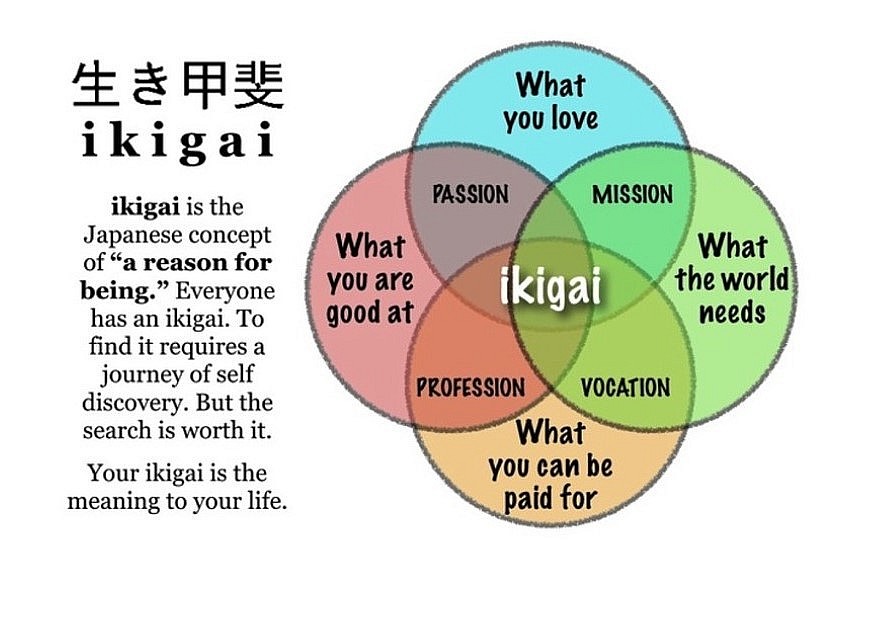 |
| Ikigai Philosophy |
In Japan, Ikigai refers to all aspects of life, including work, family, hobbies, and personal relationships. It is not necessary to strive for a single unattainable goal or purpose.
Some Japanese see the Western fascination with Ikigai as superficial.
Japan values hard work and perseverance, and the concept of a single, all-encompassing purpose in life is unrealistic. Instead, many Japanese people seek out small pleasures and sources of joy in everyday life.
Ikigai is a higher level of experiencing simple joy in life. The goal of this philosophy is to create a good life, not one filled with hedonism.
How to identify your Ikigai:
• Consider your strengths and activities that keep you engaged for long periods of time.
• Consider your abilities, strengths, and passions and how you can use them to make a significant contribution to the world.
• Explore new opportunities and experiences, and be willing to discover new passions and interests. Ikigai is a journey of self-discovery, and finding the right path may require time and experimentation.
2. Wabi-Sabi Philosophy
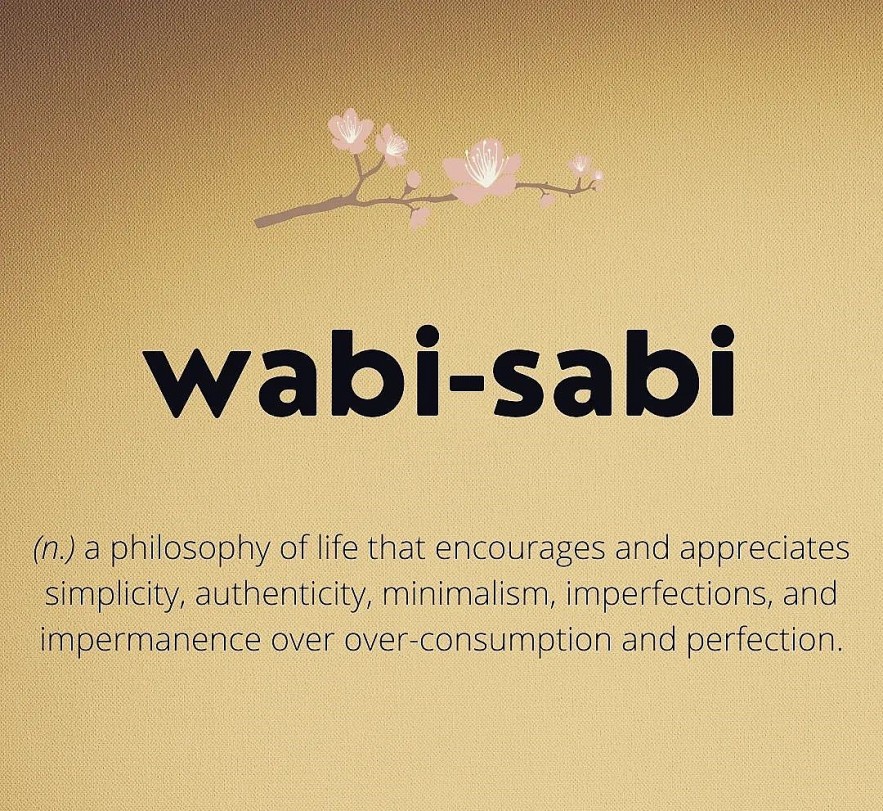 |
| Wabi-Sabi Philosophy |
Wabi Sabi reminds us that nothing is perfect, and that's okay; we can find beauty in things that are flawed, old, and imperfect.
Wabi Sabi can be found in a variety of Japanese cultural practices, including pottery making, tea ceremony, and gardening. When applied to relationships, Wabi Sabi can help us appreciate the beauty of imperfection while also finding acceptance in life's ups and downs.
Adopting the Wabi Sabi mindset can bring peace and serenity into your life. Instead of striving for perfection, you learn to accept and value the flaws in yourself and others.
How to practice Wabi Sabi:
• Learn to appreciate your partner's imperfections rather than attempting to change or fix them.
• Find beauty in impermanence and accept that relationships will change and evolve.
• Let go of any expectations of perfection.
3. Kintsugi Philosophy
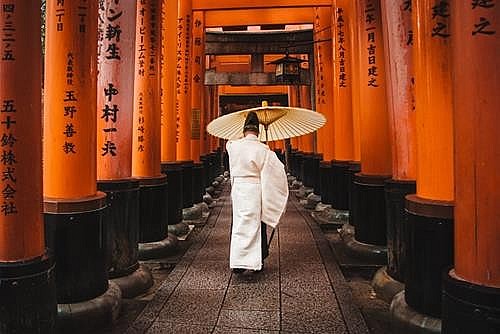 |
| Kintsugi Philosophy |
Kintsugi is a Japanese art form in which broken ceramics are repaired using gold or silver lacquer. Repairing a broken object is said to make it more beautiful.
A relationship is about accepting life's scars and flaws and transforming them into something beautiful.
Kintsugi principles can help you transform your pain into something meaningful and beautiful.
How to incorporate Kintsugi into your life:
You can learn to accept your flaws and previous mistakes. Instead of attempting to conceal or ignore them, you can recognize them and use them as opportunities to grow and learn.
Kintsugi principles can also be applied to interpersonal relationships. When you face conflict or pain in your relationships, you can work to mend the damage and strengthen the bond.
Finally, Kintsugi can serve as a reminder to appreciate and cherish the beauty that surrounds us, even during difficult times.
4. "Mono no aware" Philosophy
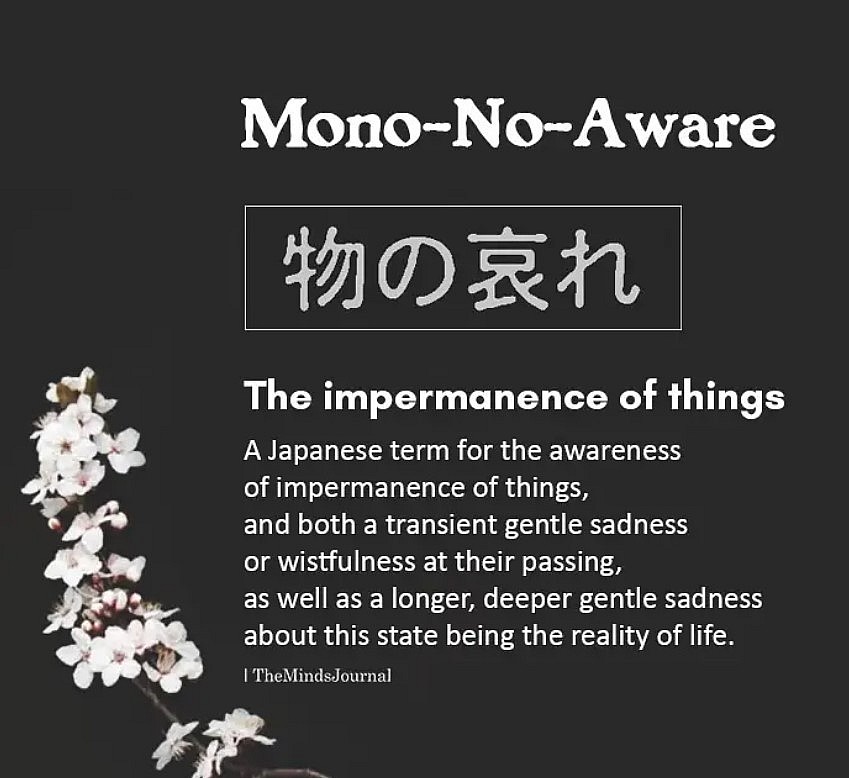 |
| Mono No Aware - The Japanese Awareness Of The Impermanence of Things |
Mono is not aware - Love of impermanence, the belief that everything is fleeting and impermanent, and that this impermanence generates feelings of beauty and sadness.
Mono no aware can be seen in a variety of Japanese art forms, including haiku poetry and traditional Japanese music. It is about recognizing the beauty of fleeting things.
Let me give you the example of Momoko, a young woman living in Tokyo who became a trusted friend over time. One day, she confessed to me that the constant noise and bustle of the city can overwhelm her.
When she was visiting her grandparents in the countryside, she walked down the country roads and noticed the change in color of the leaves on the trees, the sound of the gentle wind rustling in the fields,... It was a moment of calm and serenity that made her happy. She felt relaxed and content.
Momoko learns to appreciate the simple pleasures of life while spending time with her grandparents, such as the taste of home-cooked meals.
She realized she had been so caught up in the hustle and bustle of city life that she had forgotten to appreciate the beauty of the present moment.
Momoko's visit has ended, and she must return to Tokyo. She does, however, bring with her a renewed appreciation for the fleeting nature of life and the beauty of the present.
In Tokyo, she begins to slow down and appreciate the small moments of joy that surround her - the sound of rain on the window, the way sunlight filters through the leaves.
Momoko gradually realized that monotonous unconscious principles had become a part of her daily life, allowing her to find meaning and joy in the impermanence of all things.
Practicing Mono no aware in daily life can help you develop stronger feelings of empathy, gratitude, and emotional awareness.
How to practice Mono no aware:
• Focus on the beauty around you, such as a blooming flower or a beautiful sunset.
• Pay attention to your emotions. When you are sad or lost, allow yourself to fully experience those emotions without trying to push them away.
• Display empathy for others: Practice being present and attentive to the needs of those around you. You can make more connections and understand others by listening deeply and showing compassion.
• Practice gratitude. Take time every day to reflect on what you are grateful for.
This philosophy reminds everyone that everything only exists for a limited time. Instead of being sad about the impending loss, we should appreciate the time we have. This transformation represents the unavoidable passage of time and must thus be viewed with appreciation.
5. Shinrin-yoku Philosophy
 |
| Shinrin-yoku Philosophy |
Shinrin-yoku translates to "forest bathing". It is about spending time in nature and becoming immersed in the sights, sounds, and smells of the forest.
The average American spends 93% of their time indoors, 87% of which is at home and 6% in the car. We are nature, but we are very far from it. According to studies, spending time in nature has a positive impact on both physical and mental health. Shinrin-yoku can reduce stress, lower blood pressure, boost the immune system, and improve overall health.
It enhances cognitive function, increases creativity, and concentration.
Shinrin-yoku is also a spiritual practice that helps people connect with the natural world. In today's fast-paced world, Shinrin-yoku provides an important opportunity to slow down.
It serves as a reminder that we are part of something much larger than ourselves, and that our happiness is dependent on the well-being of our surroundings.
How to incorporate more Shinrin-yoku into your life:
Immersing yourself in nature can provide you with numerous physical, emotional, and spiritual benefits.
• Look for natural settings containing trees, water, and other natural elements. It could be a local park, a nature trail, or any other outdoor area where you can be immersed in nature.
• Shinryoku refers to being fully present in nature. Turn off your phone and any other devices that could distract you from your surroundings.
• Enjoy the sights, sounds, smells, and sensations of the natural world. Pay close attention to the color of the leaves, the sound of the wind in the trees, and the smell of the soil. Listen to birds chirping. Listen to the sound of leaves falling beneath your feet as you walk. Look at how colorful nature is. Admire the interplay of colors. Enjoy the alluring scent of the forest. Put your nose into a flower and smell it. Touch the bark. Walk barefoot through wet grass.
• Walk slowly and mindfully, paying attention to every step. Take the time to look around and fully immerse yourself in the natural environment.
• Take time to meditate or reflect on your interactions with nature. You can concentrate on feelings of gratitude or simply let your thoughts flow freely.
This concept refers to a spiritual connection with nature. The key to Shinrin-Yoku is to use all five of your senses in nature. It's more than just hiking or jogging in the park. It is about using your senses mindfully to absorb nature like a sponge.
In short, do whatever you feel like. Do it aimlessly. The goal is not to progress or achieve anything. The goal is reached. Allow curiosity to guide you. Allow your senses to tell you what to do next. Allow nature to engulf you.
6. Gaman Philosophy
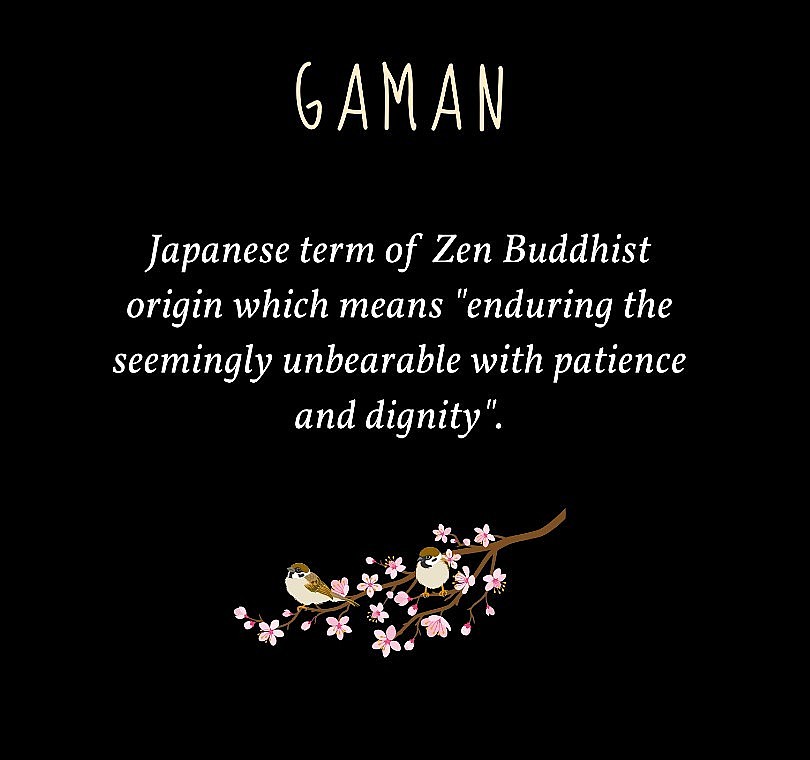 |
| Gaman Philosophy |
Gaman translates to "perseverance" or "endurance" in Japanese. It is the idea of facing adversity with dignity and grace. This Japanese concept has its roots in Zen Buddhism and entails remaining grounded and controlling how you react.
Gaman is associated in Japanese culture with the stoicism of samurai warriors and the resilience of natural disaster survivors. It is about accepting life's challenges and meeting them with patience and determination.
Stoicism teaches you to embrace what you can control, view obstacles as opportunities, cultivate inner stillness, and live in accordance with your values. In Japanese culture, practicing stoicism is regarded as a sign of maturity and strength. That includes simple things like keeping personal matters private, avoiding complaints, and remaining silent in the face of adversity.
Here's a common scenario for using Gaman in the workplace:
Naomi sat at her desk, surrounded by mountains of paperwork. She'd been working long hours for weeks, and the stress was starting to get to her.
When she saw the pile of work in front of her, she took a deep breath and said to herself, "Gaman". Those words serve as a reminder to stay focused and persevere during difficult times. That's what her grandmother used to say when she was younger, and those words have stuck with her for many years.
As she finished the tasks at hand, Naomi repeated the phrase to herself like a mantra. Naomi felt her resilience and determination grow stronger.
By embracing the concept of Gaman, she is able to concentrate on her goals and overcome even the most difficult obstacles.
Gaman can help you develop more resilience, patience, and humility.
How to Practice Gaman Daily:
• You can develop an appreciation for the challenges and obstacles you face. You can then use these experiences to improve yourself.
• When you face challenges or obstacles, remind yourself to stay focused on your long-term goals. Instead of becoming discouraged, use the concept of gaman to keep yourself motivated and moving forward.
• Gaman also represents patience and endurance. In today's fast-paced world, it's easy to become discouraged when things don't happen immediately. However, by practicing patience and endurance, we can learn to value the journey and process.
Gaman also encourages us to remain humble in the face of adversity. Instead of feeling entitled or victimized, view challenges as opportunities for growth and learning.
In Japanese culture, Gaman is frequently used to motivate and support others. When you notice someone going through a difficult time, encourage them and remind them to persevere.
So, the next time you face a challenge or a failure, take a deep breath and remind yourself to "gaman".
7. Shikataganai Philosophy
 |
| Shikata Ga Nai - The Japanese Philosophy that Inspires Startups |
"Shikataganai" is a common Japanese saying that means "it can't be helped" or "it can't be avoided" or "just let it be". This philosophy emphasizes resilience, accepting what we can't control, and moving forward regardless of circumstances.
It's a reminder that some things are beyond our control, and we must find ways to adapt and move on.
However, Shikataganai should not be used to justify complacency or inaction. It encourages us to find solutions and take action whenever possible, while acknowledging the limitations under our control.
We admit that there is no other option than to face and accept. It's a powerful reminder to live in the present, let go of the past, and move forward with resilience and determination.
Shikataganai can be seen in Japanese culture through Zen Buddhism's philosophy and acceptance of death's inevitability. Adopting the Shikataganai mindset can help you let go of your worries and find peace in the present moment.
How to implement Shitakaganai in your daily life:
Applying Shikataganai to everyday life can be difficult. Here are some strategies for cultivating this mindset:
• Recognize that some situations are beyond your control. Instead of focusing on them, accept them and concentrate on what you can change.
• Instead of thinking about the past or the future, concentrate on the present moment. It can boost your confidence and motivate you to take positive action.
• Look for opportunities in difficult situations and choose something positive to focus on. It can help shift your mindset from negative to grateful and appreciative.
• Although some circumstances are beyond our control, there are often steps we can take to improve our situation. Take action whenever possible and concentrate on solving problems over which you have control.
• Remember to be kind to yourself and cultivate self-compassion. Setbacks and challenges are a normal part of life; treat yourself with the same compassion and understanding as you would a friend.
8. Kaizen Philosophy
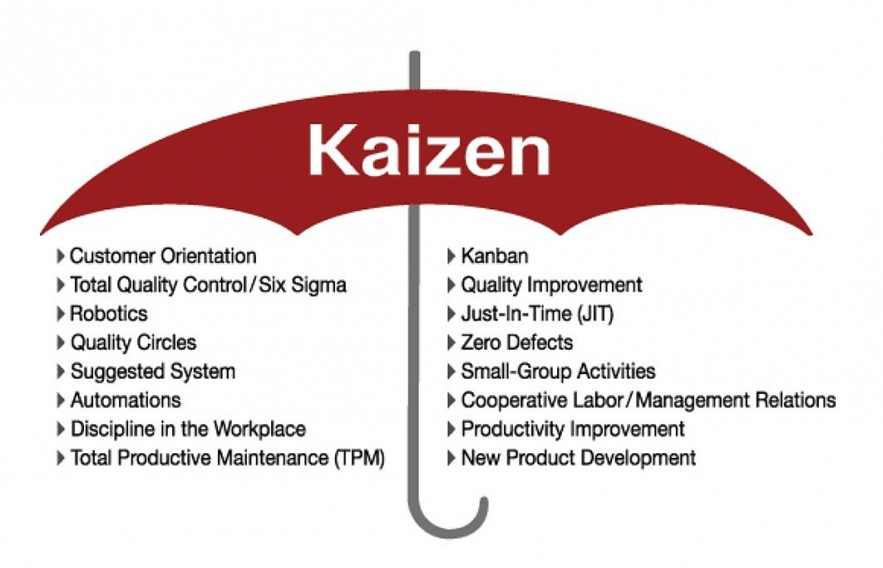 |
| Kaizen Philosophy |
Kaizen denotes continuous improvement, which occurs every day and hour.
This is a term that encourages us to constantly change for the better and look for ways to improve. Kaizen is very similar to the concept of accumulating the small into the great in Vietnamese culture.
This concept is particularly relevant in the business sector, where higher standards are thought to help reduce waste and increase efficiency. It also applies to any area of life where you should foster growth.
To apply Kaizen in life:
• Try to generate new ideas every day, regardless of their quality. Write them down immediately to avoid forgetting them.
• Learning to simplify entails breaking down the problem into smaller parts in order to deal with it effectively. To make large goals more manageable, break them down into smaller goals.
• Maintaining the habit of asking questions before working is important because it indirectly aids brain development and, over time, develops the ability to analyze the situation.
• The 1-minute rule states that if you allow yourself to complete a task within one minute because you are afraid, lazy, or don't want to do it, you are not required to continue doing it. The next day, repeat for 1 minute.
In Conclusion
When we face problems, we always feel as if life is difficult. Understanding the typical Japanese philosophy of life, as well as the unique concepts deeply ingrained in this society, will allow us to drastically change our thinking and way of life.
Don't just understand it; apply it every day to achieve happiness according to your own definition, while avoiding the "fake" surroundings that people constantly try to associate with their lives.
 Ranking of the Luckiest and Unluckiest Birthdays 2024 By Japanese Astrology Ranking of the Luckiest and Unluckiest Birthdays 2024 By Japanese Astrology Your Luck and Unluck Index for the year 2024, the Year of the Dragon, according to Japanese numerologist and astrologers, is based on your birthdate. ... |
 Top 12 Free Sites To Download Japanese Boys’ Love Dramas for Watching Top 12 Free Sites To Download Japanese Boys’ Love Dramas for Watching These websites provide the opportunity for viewers to stream and download Japanese romantic comedies featuring male protagonists. |
 Top 12 Most Beautiful Japanese Actresses 2024/25 Top 12 Most Beautiful Japanese Actresses 2024/25 There has been a gradual but steady increase in Japan's beauty standards. The world knows Japan for its innovative movies, formidable martial arts, and robust ... |
 Top 10 Best Hospitals In Japan for Foreigners and Citizens Top 10 Best Hospitals In Japan for Foreigners and Citizens Japan offers the best medical services in Asia. Which Japanese hospitals are the best for citizens and foreigners alike? You can read the article to ... |
























